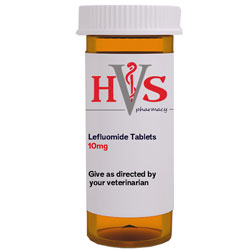Leflunomide Tablets
Veterinarian Prescription (Rx) Required
Free Shipping on orders over $75
Low Price Match Guarantee
- Treatment (often combined with other immunosuppressants) for AIHA or ITP
- Either a first line drug or for refractory cases
- For dogs
Description
Leflunomide has been used as a treatment (often combined with other immunosuppressants) for AIHA or ITP, as either a first line drug or for refractory cases in dogs. Additionally, we are commonly using Leflunomide combined with prednisone as initial therapy for immune mediated polyarthritis, rheumatoid arthritis and GME. Using Leflunomide as part of the initial treatment in immune mediated diseases allows for prednisone to be decreased more quickly in dogs that are sensitive to its side effects. Leflunomide used in combination with other drugs as an initial treatment in GME has also shown great promise in increasing longevity and preventing relapses.
How It Works
Leflunomide is a medication that acts as an immunomodulator, or a substance that will affect how the immune system functions. Leflunomide works by inhibiting the production of T-cells and B-cells which are a part of the immune response.
Indications
Leflunomide tablets are indicated in adults for the treatment of active rheumatoid arthritis (RA):
- to reduce signs and symptoms
- to inhibit structural damage as evidenced by X-ray erosions and joint space narrowing
- to improve physical function
Aspirin, nonsteroidal anti-inflammatory agents and/or low dose corticosteroids may be continued during treatment with leflunomide tablets. The combined use of leflunomide tablets with antimalarials, intramuscular or oral gold, D penicillamine, azathioprine, or methotrexate has not been adequately studied.
Directions
starting dosages in dogs are 2-4 mg/kg once a day. In cats we use 2mg/kg once a day (10mg/cat on average) for several days and then usually decrease to every other day. The drug reaches steady state fairly rapidly in about 4 days. Ideally a trough blood serum level (22-24 hours post pilling) should be measured about 10-14 days after starting and dosage adjustments may be made based on these values and the patient's clinical response.
Caution
The drug is generally very well tolerated, but side effects include deceased appetite, vomiting, and diarrhea. Decreases in leukocytes, red cells and platelets can be seen. Possibly the most common side effect seen in dogs is a rapidly developing cutaneous, ulcerative drug eruption. This drug eruption is frequently seen on the nasal plane, face or food pads, but on occasion will occur on the neck or truncal skin. This drug eruption rapidly resolves if Leflunomide therapy is discontinued. In people, acute hepatic necrosis has been reported, and although this has not been reported in dogs, there have been suspected cases that can present similar to that of imuran toxicity. For these reasons, a CBC should be monitored monthly, as well as intermittent liver panels.
Precautions
Keep away from children and animals. Leflunomide should not be given to pregnant animals or animals with severe kidney failure.
Side Effects
Side effects of Leflunomide may include : decreased appetite, tiredness or vomiting.
Storage
Store at 25°C (77°F); excursions permitted to 15° to 30°C (59° to 86°F) [see USP Controlled Room Temperature]. Protect from light.







